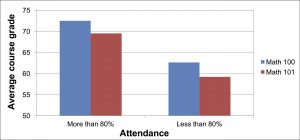“Don’t fall behind – the course moves quickly and so must you.”
Nicole – former Math 100 student
University math courses are much faster paced than high school math courses. One of the keys to being a successful university student is being able to adjust your study habits to deal with this faster pace. In addition to keeping up with the course, see the sections on WeBWork and using study time efficiently to get the most out of your time studying.
Attending class
“Keep up with the material from every lecture because the lessons build up on each other.”
Mary – former Math 180 student
As the term progresses and responsibilities add up, you might be tempted to skip class to meet deadlines for other courses, with the intention of catching up the material on your own time after the lecture. Often you may not find the time to catch up, and the result will be that you will have difficulty following the next lecture.
Based on student surveys from last year, students who attend 80% or more of their lectures have an average final grade about 10% higher in their first year math course than those who attend less than 80%. The graphs below show examples for Math 100 and Math 101 (data obtained through surveys administered in 2016W).

Click on the graph for more detailed data and statistics. Data obtained using student surveys in Math 100 and Math 101 in 2016W at UBC. Research funded by the CWSEI and the Department of Mathematics.
Reviewing regularly
“Review your notes everyday after class because if you don’t understand a concept it’s hard to move on since everything is related.”
Daniella – former Math 110 student
University mathematics lectures are very dense with information and you may often find you are not able to understand everything during the lecture. In these cases you will find it helpful to schedule a specific time when you will review your course notes or the textbook. For example, if you have a one hour break either before or after your regular lecture time, this would be an ideal time to review your notes or textbook. For information about how to efficiently use your time reviewing, see the section on efficient studying.
Finding time for practice
“Create a time dedicated to studying math. I found it hard at the beginning to balance studying my other subjects with math; I would only study a few days before the quiz.” –
Millie – former Math 100 student
One of the challenges of a university mathematics course is that in addition to doing the assigned homework, you are expected to regularly set aside several hours a week on additional practice problems. A common mistake is to leave all of this extra practice until before a quiz or test. A better approach is to set aside several times each week for doing this additional practice. The best times are those which don’t conflict with the due dates for your weekly assignments. By practicing regularly, you’ll give your brain the best chance of absorbing new techniques and concepts and transferring them to long term memory.

